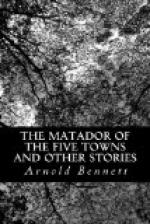Then I knew that it was Manchester and not Knype that had suffered. The confusion and hubbub were in a high degree disturbing and puzzling. But one emotion emerged clear: pleasure. I felt it myself. I was aware of joy in that the two sides were now levelled to ten men apiece. I was mystically identified with the Five Towns, absorbed into their life. I could discern on every face the conviction that a divine providence was in this affair, that God could not be mocked. I too had this conviction. I could discern also on every face the fear lest the referee might give a foul against the hero Myatt, or even order him off the field, though of course the fracture was a simple accident. I too had this fear. It was soon dispelled by the news which swept across the entire enclosure like a sweet smell, that the referee had adopted the theory of a simple accident. I saw vaguely policemen, a stretcher, streaming crowds, and my ears heard a monstrous universal babbling. And then the figure of Stirling detached itself from the moving disorder and came to me.
“Well, Hyatt’s calf was harder than the other chap’s, that’s all,” he said.
“Which is Myatt?” I asked, for the red and the white dolls had all vanished at close quarters, and were replaced by unrecognizably gigantic human animals, still clad, however, in dolls’ vests and dolls’ knickerbockers.
Stirling warningly jerked his head to indicate a man not ten feet away from me. This was Myatt, the hero of the host and the darling of populations. I gazed up at him. His mouth and his left knee were red with blood, and he was piebald with thick patches of mud from his tousled crown to his enormous boot. His blue eyes had a heavy, stupid, honest glance; and of the three qualities stupidity predominated. He seemed to be all feet, knees, hands and elbows. His head was very small—the sole remainder of the doll in him.
A little man approached him, conscious—somewhat too obviously conscious—of his right to approach. Myatt nodded.
“Ye’n settled him, seemingly, Jos!” said the little man.
“Well,” said Myatt, with slow bitterness. “Hadn’t he been blooming well begging and praying for it, aw afternoon? Hadn’t he now?”
The little man nodded. Then he said in a lower tone:
“How’s missis, like?”
“Her’s altogether yet,” said Myatt. “Or I’d none ha’ played!”
“I’ve bet Watty half-a-dollar as it inna’ a lad!” said the little man.
Myatt seemed angry.
“Wilt bet me half a quid as it inna’ a lad?” he demanded, bending down and scowling and sticking out his muddy chin.
“Ay!” said the little man, not blenching.
“Evens?”
“Evens.”
“I’ll take thee, Charlie,” said Myatt, resuming his calm.
The whistle sounded. And several orders were given to clear the field. Eight minutes had been lost over a broken leg, but Stirling said that the referee would surely deduct them from the official time, so that after all the game would not be shortened.




